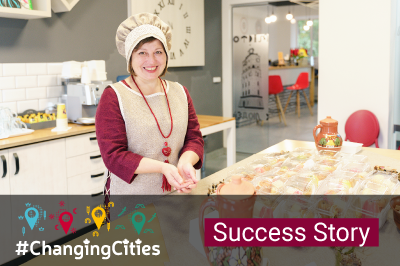
In the autumn of 2020, a start-up project called “Queen Bona’s Kitchen”, focused on preparing medieval dishes, was launched in the City of Bar, Vinnytsia Region. It was named after the city’s founder – Polish Queen Bona Sforza. Oksana Bas, a resident of the village of Haiove, in the Bar Rayon, started the gastronomic initiative. One of the important stages in developing the idea of the start-up was Oksana’s participation in business basics training provided with the support of the Partnership for Local Economic Development and Democratic Governance (PLEDDG) Project. Such training activities help women unleash their business potential and provide fundamental knowledge not only about business planning, but also about product promotion.

“I knew that the training event would give me much more information than just ‘how to register a private enterprise.’ I learned how to effectively sell goods or services, which online sales platforms are currently available, how they work, and how to use them effectively. Moreover, I learned a from other participants: women who actively demonstrate creativity in completely different areas,” said Oksana Bas, the founder of the Queen Bona’s Kitchen Project.
The idea of Queen Bona’s Kitchen evolved gradually, drawing on lengthy experience in providing rural green tourism services in the village of Haiove, where Oksana Bas and her husband have been receiving guests on the Podilska Rodyna Estate for over 13 years. Oksana has long studied the facts and traditions of the Middle Ages. She knows dozens of legends about Queen Bona Sforza and is deeply interested in the history of the region. Oksana is also the founder of the Bona Sforza Women’s Club which brings together about 25 local women to support and promote each other’s initiatives.

In the summer of 2020, the business plan for Queen Bona’s Kitchen as a “small craft restaurant with open spaces for enjoying food and experiences,” was one of the winners of a competition of start-up business plans, conducted by the Vinnytsia Oblast State Administration and WALL (an association of entrepreneurs). The start-up recreates the atmosphere of the medieval times when the City of Bar was founded, including the way food is prepared and served, relevant accompanying music, clothes, etc.

In October, Queen Bona’s Kitchen received its first order for catering services: it hosted fifteen participants in a business basics training event, organized by the PLEDDG Project. Although the hostess of the Kitchen had to cook all night and, the following day, drive 80 km to Vinnytsia, where the training event took place, everything went very well (and tasted delicious too!). Oksana uses only local seasonal products for cooking, guaranteeing ingredients of high quality and freshness, as well as supporting local producers.

“It was important for me to finally try to provide catering services in practice, to see the reaction of people and to receive their feedback. I am very grateful to the PLEDDG Project for the opportunity to demonstrate my skills. I provided women with muffins, baked apples with cottage cheese filling, panna cotta with fresh peaches, cookies in the shape of Bona Sforza’s seal, plus raspberry and blackberry teas. In addition, I made a speech to participants at the training event and told my story, so the catering case became an illustrative example. I am sure that communication and sharing best practices between women plays a very important role, contributing to greater strength and faith in their endeavors,” added Oksana.
PLEDDG-sponsored training activities provide women with new knowledge and inspiration to start their own businesses. They also serve as a platform for building useful contacts that later evolve into mutually beneficial cooperation. For example, Oksana Bas got acquainted with Lesya Zianaurova from Vinnytsia at the training event. Lesya is a designer and craftswoman who sews clothes, including felt items. Oksana liked the products so much that she presented the first Queen Bona’s Kitchen catering event in a themed dress designed by Lesya.

Business training events for women initiated by the PLEDDG Project stimulate entrepreneurial activity in some cities and villages. Queen Bona’s Kitchen demonstrates that women can develop the region’s tourism potential, create new jobs, increase local budget revenues, and contribute to the growth of related businesses and surrounding communities. International studies show that if women participated at the same level of activity as men in business, the global GDP could grow by 3-6%, a gain for the world economy of an additional $2.5 to $5 trillion, thereby strengthening the role of women as a driver of economic growth benefiting everyone.
| Download success story A Women’s Start-Up Specializing in Preparing Medieval Dishes Launches in the Vinnytsia Region in pdf. |













